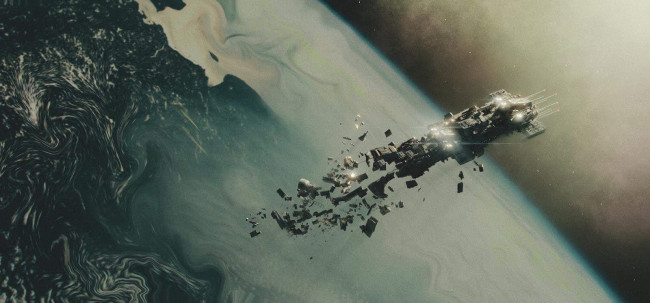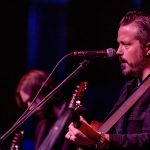Wilkes-Barre rockers Gods of Space break down new sci-fi album ‘Against a Falling Sky’ track by track

On April 20, Wilkes-Barre sci-fi stoner rock band Gods of Space released an epic concept album titled “Against a Falling Sky.” Listeners can enjoy looking at the gorgeously detailed cover artwork of a spaceship breaking into pieces over the swirling atmosphere of a blue and green planet while hearing the soaring tenor voice of vocalist/guitarist Jake Waxmonsky describe the space-faring events unfolding over 24 minutes.
On Bandcamp, the story is described succinctly: “A crew of navigators take a ship up into orbit. Once in orbit, the ship begins to fail. This is the story of the escape attempts of said crew.” NEPA Scene wanted to know more, so during an extensive interview with Waxmonsky, bassist Matt Hannon, and drummer TJ Lepkowski, they told us everything, including the origin of that image from another world – the United Kingdom.
“I ended up finding this amazing artist on Reddit named Karl Poyzer from the U.K. He was posting all kinds of great artwork that reminded me of classic sci-fi book covers and I thought I’d send him a message. I knew we wanted to call the album ‘Against a Falling Sky’ and had kind of a rough idea of what we’d like the artwork to look like,” Hannon recalled.
“Karl and I discussed ideas for a bit over email, and I brought up the concept of a ship being ripped apart in orbit by the gravity of a planet. Karl went to work and, within a couple of hours, he had sent us back a quick sketch of the idea, which was spot-on with what we were looking for. He added a few touches and colored it and sent it to us within a couple days, and we were blown away. It really wrapped the whole album concept up.”
He said that diving into science fiction move heavily on this record “was just a natural progression of our sound and ideas for the band – just wanting to share more stories from our ‘universe.'”
“I agree with Matt that it did come naturally,” Waxmonsky noted. “For myself, I wanted to write a more focused record. The last one was like a smashed together group of ideas that were like a round peg shoved into a star-shaped hole labeled ‘sci-fi.'”

“One of the main differences between all of our albums is that each one has a different drummer on it, and each one of those drummers added their own unique element to the playing. For example, on ‘Til Human Voices Wake Us,’ Tommy [Pudimont] had a fantastic heavy bombastic feel to his drumming, and I think that made us write heavier riffs to compliment his style. TJ on our latest album is really great at coming up with fills that tie a section together, and he isn’t afraid to experiment within the songs. I also got into modular synthesizers between the last two albums, and we wanted to add elements of that to our production. We also went into the recording process with an open mind and added new sonic elements within the songs, whether it was keys or different percussion, just to add some new sounds,” Hannon continued.
“For me, it was the focus on songwriting and music theory. I just thought about lyric flow, concepts, and chord progressions. I think overall we spent more time writing music versus ‘Man, that’s cool – write more cool parts,'” Waxmonsky added.
“I wanted a complete idea on this EP. I got some songwriting books over the shutdown, dumped all the lyrics I wrote beforehand, and started fresh. I focused on the type of stuff you’d learn in any creative writing class. As much as I want to nerd out and be like, ‘I used a first-person view here and this word here versus that word,’ I don’t think anyone wants to read a dissertation!”
We did, however, want to hear a breakdown of each track and how they play into the narrative, so Waxmonsky agreed to do just that before the band’s live stream on the NEPA Scene Facebook page and YouTube channel tonight at 8 p.m. where they will play the album in its entirety from Novro Studios in Shavertown.
“The story is about a ship leaving a planet, going up into its launch, and once it’s moving out of the local solar system, it’s sabotaged by some stowaways. We come in with our story with the rescue crew on ‘Against All Odds.’ It’s essentially a scene setting for the whole record. We’re following a rescue crew that is going to save our sabotaged ship. You move from like, ‘Cool, this spaceship is taking off, now they’re doing space shit,’ then in verse three we’re going, ‘Oh it’s a rescue?’ and the bridge is a move to first-person view to nail in the point that our crew’s rescue is in vain.”
“So then our next tune is ‘Suborbital Hymn.’ We’re now in the perspective of one of the crewmates on the jettisoned ship; you’re now living through anxiety of the sabotage. One thing that I like in this song is that musically its changing on each part. It helps pace the tension of the story, with the hook of the song being an anchor to latch on. The changes also make you feel like you’re in that frantic anxious ‘We need to take action or else’ mindset. It’s also such a challenge to sing and play, so it makes me feel like it’s do or die!”
“Next is ‘Exit Point.’ We’re now in the mind of a ship navigator who’s having a flashback. I took inspiration from ‘Dune’ with how their navigators are like these special chosen vessels to navigate space. This song is the most cliché stoner rock thing I did on this record. It’s just a dude minding his own business when some space witch is like, ‘I am gonna touch your third eye and you’re gonna trip face. Oh, and by the way, I am kidnapping you to be a space navigator.’ So this song is like a nice break from the action overall. You get a little personal story inside this overall narrative.”
“‘Falling Sky’ is another setting change. We’re on the planet below watching the ship literally explode and it is falling into the planet like a meteor shower. I wrote the lyrics as if a tribe that was outside mainstream techy society was seeing this as some fate-ridden prophecy from their deities. I did not want to write it like ‘haha dumb natives’ because I can’t stand the ‘savages’ narratives indigenous cultures often get treated from media or Hollywood, so I really choose my words to make it feel the least amount of cliché possible. That idea of tribalness kind of reflects in that bridge where TJ laid down a great drum beat over Matt’s groove where I used this real beautiful scale that has an Eastern feel to it.”
“‘Prisoner Transport’ is our last song. It’s quiet and subdued. We’re now aware that a prison ship was the target of the attack. It’s a tune about a prisoner getting off the ship and a warden choosing to let these people free as opposed to commit them to death. I love this song because it’s functionally a surf song. We were referencing lots of surf music as we wrote the tune. When we finished writing, we heard Dick Dale died. In that sense, we accidentally wrote a tribute and we like to keep that homage in mind to him and that genre as a whole.”
Read the full interview here and learn more about Gods of Space in Episode 92 of the NEPA Scene Podcast:
Album artwork by Karl Poyzer
by Rich Howells
Rich is an award-winning journalist, longtime blogger, photographer, and podcast host. He is the founder and editor of NEPA Scene.



